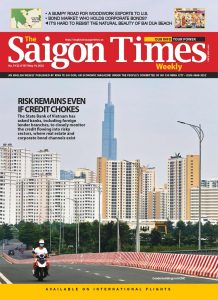The State Bank of Vietnam has asked banks, including foreign lender branches, to closely monitor the credit flowing into risky sectors, where real estate and corporate bond channels exist. This article will analyse the risks banks face while funding property projects and address suitable solutions.
Increasing speculation?
Credit flowing into the property sector is believed to give rise to speculation. As money in the bank can be easily accessed, anyone can become “a real estate investor”, surfing on the wave of buying and selling for profit. The move will contribute to driving a property price hike and sparking land fever. For that reason, tightening the faucet of credit flowing into the property sector can be a solution.
However, this solution might negatively impact homebuyers, not speculators and investors who abound in the market. It is unworkable to apply the policy to everyone. Also, limiting financial sources to the property sector will push real estate companies into difficulties, resulting in decreasing housing supply and increasing property prices in the future. The move will make speculators more active.
In foreign countries, such as Singapore, credit for the property sector is tightened selectively. Commercial banks consider a home loan request based on the borrower’s income, assets and ability to repay.
Therefore, banks can lend to customers no matter who they are—homebuyers, investors or speculators. After all, there is a thin line between investors and speculators, even homebuyers. That’s because it depends on the way of looking at it when there is a chance to earn some profit.
In other words, when in need, people can seek money from banks, provided they are able to repay the loan.
Credit will go to production, business?
It is arguably another big risk if banks are fond of granting credit to the real estate sector while overlooking or having less money for production and business, especially priority sectors. As such, it is reasonable to tighten lending to the property market to save funds for production and business.
The solution is not totally appropriate to commercial banks. As businesses seek ways to maximize their profits, commercial banks have the same right to do profitable business. To encourage banks to direct their capital into priority sectors, the State Bank of Vietnam should create a favorable mechanism. If not commercial banks will find ways to dodge the law, lending money to property projects without officially recording the credit on their books as long as their credit growth does not go beyond the caps approved by the State Bank of Vietnam.
It is apparent to everyone that the State Bank of Vietnam knows the effectiveness of limiting lending to the property sector, so its policy stops at “asking” banks to control credit to this sector. Reality shows that the solution has been in place for years but has failed to prevent land fever from repeating..
 Marco economy more stable?
Marco economy more stable?
Easy lending will lead to a land fever, which will eventually subside later. By then, investors/speculators might get stuck with their properties, and banks might be buried in a pile of mortgages, including properties with hiked prices, and find it hard to escape the situation without facing bad debt. A series of risks at the macro level will come, causing exhaustion of liquidity, driving up interest rates and dealing a blow to the banking system. For that reason, preventing money from flowing into the property sector is like killing two birds with one stone. It helps stabilize the macroeconomy, combat speculation and prevent housing prices from going wild so that Vietnamese can afford homes.
The aforesaid analysis shows that tightening loans for the property market will have a lower effect if commercial banks still see real estate as a lucrative sector and still have room to grow credit in the sector, including dodging the law. So, the core solution is to avoid allowing an abundant amount of money to flow into the economy if we do not want to see property, securities or other markets overheating. The Ministry of Construction, in its recent quarterly report, mentioned that this might also cause a potential land fever in the coming time. It is the monetary policy of the State Bank of Vietnam that decides if money is enough or abundant in the economy.
Will the market become more transparent?
It is believed that the property market would be more transparent when loans for it are tightened. Then, investors, especially small ones, will not be able to use bank loans as leverage to buy land or housing for quick profit. They will not rush into real estate, including buying properties unclear origin but look for legal projects with better prices.
As analyzed above, it is not only banks that find ways, including dodging the law, to pour their money into the real estate sector if they see potential profit, but also investors/speculators who seek ways to get involved once they see their chances.
When an investor borrows money from banks to buy a property in a project with no legal papers, it means there is cheap money in the market, and the low-interest rate allows investors to take their chances. There needs to be a macro policy to make money more expensive to make the market healthy. In other words, a suitable solution will come from a proper monetary policy.









